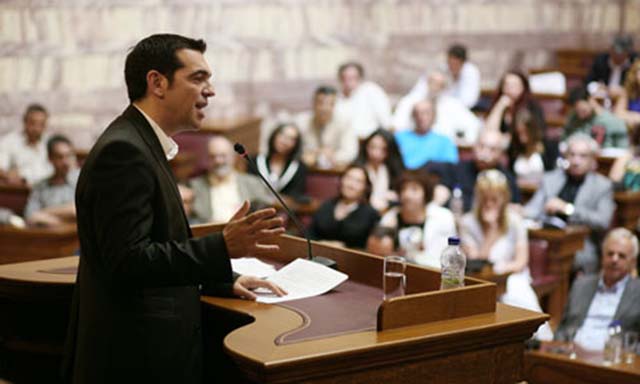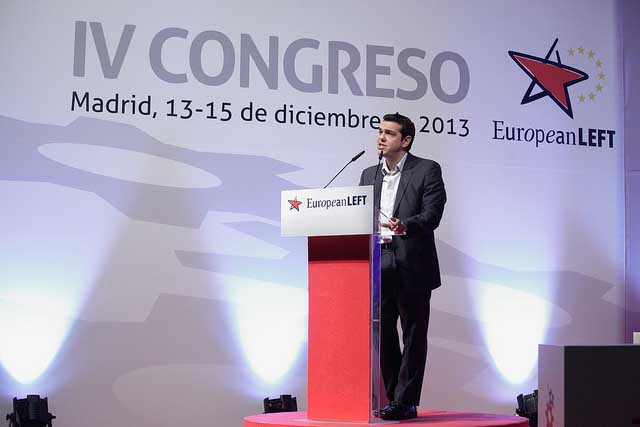- Details
-
Category: STATEMENTS
-
Published: Thursday, 27 December 2012 19:13
He came from Greece’s political wilderness – yet for a few days in June Alexis Tsipras held the future of the euro in his hands. Six months on, the fast-talking firebrand who took the world by storm in the runup to the Greek elections may no longer be in the spotlight, but he has not faded into history. “We may have narrowly lost the battle,” Tsipras says of the failure of his radical left Syriza party to clinch power. “But we have not lost the war.”
As leader of the main opposition in the country on the frontline of Europe’s debt drama, Tsipras is now ensconced in an elegant office on the ground floor of the Greek parliament, a former royal palace that looks on to Syntagma Square, the theatre for the robust rallies that have rocked Athens over the past three years.
Syntagma is likely to see more tumult in the months to come – next year is poised to be the roughest since Greece descended into economic freefall following revelations of the true scale of its budget deficit in late 2009.
“We are the great hope for change,” the politician says, his arms sprawled across the back of an armchair. “And we don’t want only to stop the catastrophe, the bad medicine,” he adds, referring to the recession-inducing austerity cuts Greece has applied in return for rescue loans from its “troika” of creditors at the European Union, European Central Bank and International Monetary Fund. “We also want to change Greece – all the positive structural reforms can only be done by us. The political environment was one of the main reasons for the crisis, as was a public sector created to bring in votes.”
At 38, with the addition of a newborn son to his four-member family, the young politician has come a long way since the days when his disparate alliance of leftists, greens, Marxists and Maoists worked out of a couple of shabby rooms on the second floor of the parliament building – a reflection of the mere 4.5% that the party then polled.
Propelled by vehement anti-austerity rhetoric and uncompromising opposition to policies that have seen the disposable income of most Greeks drop precipitously, Syriza’s fortunes have risen dramatically.
Greece’s landmark June election was billed by Antonis Samaras, the man who went on to win the ballot, as a stark choice between painful reforms that would keep the country in the euro and opting, via Syriza, for a return to the drachma. Support for the leftists soared, with the party taking 29.6% of the vote.
Tsipras’s own oratorical flair and charisma have undoubtedly contributed to the ascent. Public opinion surveys have repeatedly put his party in the lead since the summer. He has his sights on power. Demands for fresh elections are likely to be heard frequently over the course of 2013.
“This government does not have a long lifeline,” he says, waving his arms for emphasis as he lists the measures adopted by his “dogmatic neo-liberal” political enemies that, he continues, have been tried and failed miserably.
“Greece is unique. Even after its debt was restructured it continued to go up,” he says. Because the measures were self-defeating, he adds, they were doomed to exacerbate the country’s economic death spiral. “A haircut is inevitable and it will happen after the German elections [next September].”
Critics contend that Tsipras is betting on disaster. He is, they say, a demagogue with merely a schoolboy knowledge of economics and the intricacies of global finance. For Samaras and his junior partners, power-sharing in an uneasy coalition, Syriza is not only irresponsible but dangerous to boot.
The party’s embrace of the state and steadfast refusal to accept the privatisation of public utilities – with Tsipras often being compared to the late socialist strongman Andreas Papandreou – is, they argue, disastrous for a country dependent entirely on international creditors to keep replenishing its near-empty public coffers.
The former pony-tailed communist sticks to his guns: “The problem with the public sector is not one of quantity but quality,” says Tsipras. “We are at a European average in terms of size.”
This week as he made his first official trip to Latin America – meeting not only the president of Brazil, Dilma Rousseff, but her predecessor Luiz Inácio Lula da Silva – Syriza’s foreign policy was similarly derided. But the party shot back, saying the visit was part of efforts to “internationalise the Greek debt problem” by pursuing a multifaceted foreign policy that is not only dependent on the EU.
Yet while Tsipras is clearly preparing for power, he is also putting water in his wine – and not only because the disaffection of the middle class is bound to grow with the implementation of austerity measures in 2013 that are billed as the toughest yet. Last month Syriza took the historic step of uniting as a single force, with an overwhelming 75% voting to create a central committee led by Tsipras and the party’s decisively pro-European wing.
With maturity have come moderation and a self-confidence on the part of Tsipras that was previously lacking. The dress code, like the first grey flecks in his raven black hair, has changed. Jeans, increasingly, have been replaced by sharper suits, Italian shirts and suede shoes along with a striking improvement in spoken English for a politician who, unlike many in the Greek political establishment, did not attend private schools or universities abroad. “I watch CNN and read the Guardian now,” Tsipras says.
But aides insist that while the party’s tone may have changed – a byproduct of being forced to grow up abruptly – its overarching objective remains the same: abolition of the memorandum outlining the terms of Athens’s bailout and renegotiation of the loan agreement it has signed with its partners.
“From the first year of the crisis everything we have said has come true,” says Tsipras. “Of course we feel vindicated but it’s not enough. The whole policy has to change.”
- Details
-
Category: STATEMENTS
-
Published: Sunday, 09 December 2012 19:20
Only weeks after the EU and IMF announced a third plan in as many years to rescue Greece from insolvency, the country’s most popular party – its radical left opposition – has called for a European debt conference to “finally” settle a crisis it claims is no nearer to being solved.
In an exclusive interview, Alexis Tsipras, who heads the stridently anti-austerity Syriza, insisted that with the debt drama spreading it was vital that foreign lenders take a leaf out of the history books by dealing with the eurozone’s crisis-hit southern periphery in much the same way that Germany had been treated after the second world war.
“It is quite clear that the latest agreement was a compromise that will only perpetuate the uncertainty … Merkel has to say to her people before [the 2013 German] elections that the programme is not working,” he told the Guardian.
“The only viable solution is a haircut not only for Greece but the entire southern periphery,” said the leader, emphasising that the longer creditors postponed writing off a significant portion of Athens’ staggering debt the greater the cost both socially and economically.
“That is why we are proposing a conference along the lines of the one that took place in London in 1953, which relieved Germany of around 60% of its debt. We want to agree with our lenders on a credible solution. It doesn’t matter where it takes place but it should happen as soon as possible.”
As an allied power, Greece, ironically, had been present at the conference whose debt agreement would go on to lay the foundations for Germany’s post-war economic miracle. The pact had allowed Hitler’s destroyed country to not only repay its debt over a 30-year period but had also stipulated that its financial obligations would also be dependent on Germany’s economic performance.
If Greece’s shattered economy was ever to recover, Tsipras said it was crucial that it, too, was also given “a growth clause” that would likewise tie the repayment of Athens’ debt load to its ability to pay. “We are also asking for time, a moratorium, of servicing the debt so that we can redirect that money to growth,” he said, adding that the suspended interest payments, projected to amount to about €13bn every year, would be used to kick-start the moribund Greek economy. “It would be a win-win solution.”
The charismatic politician, catapulted into the spotlight when his party received a fivefold rise in support in elections in June, insisted that the piecemeal approach of international creditors to resolving the crisis would not only destroy Greece but the entire continent.
“There are two pillars to Europe’s economic problem, the first being the debt which has to be made viable and the second being austerity which has to finish. If we continue with such measures it is like putting oil on the fire,” he said.
Tsipras’s economic policies have often been ridiculed by the prime minister, Antonis Samaras, as “dangerous and half-baked”. But the 38-year-old left-winger has also been vindicated. Greece’s pursuit of austerity in the name of brutal fiscal adjustment has created record levels of poverty and unemployment, trapped it in recession and repeatedly resulted in missed budget targets that have plunged the country into an ever-deeper death spiral. It had opened up bottomless pits in Europe’s south that taxpayers in the north were then called to fund.
Although the latest rescue includes a complex bond buyback scheme, which will shave about €30bn from the country’s €340.6bn debt pile, it was, he argued, still a case of creditors “buying time” and, as such, was far from adequate.
“When the crisis began in 2009 our debt stood at 120% of our GDP. This year it is projected officially to be 175.6 %. And now they [EU-IMF] say that to make the debt viable we must hit 124% of GDP by 2020,” he said, shaking his head in disbelief.
“Let’s suppose they are right – but how do they want to get there? After 12 years of catastrophic austerity and measures totalling €19bn Greece will have become a no-man’s land.”
• This article was amended on 10 December 2012 to correct a reference to Greece’s suspended interest payments being €13 per year.
- Details
-
Category: STATEMENTS
-
Published: Monday, 08 October 2012 18:07
As Angela Merkel visits Athens on Tuesday, she will find a Greece in its fifth consecutive year of recession. In 2008 and 2009, the recession was a spillover from the global financial crisis. Since then it has been caused and deepened by the austerity policies imposed on Greece by the troika – of the International Monetary Fund, the European Union, the European Central Bank – and the Greek government.
These policies are devastating the Greek people, especially workers, pensioners, small businessmen and women, and of course young people. The Greek economy has contracted by more than 22%, workers and pensioners have lost 32% of their income, and unemployment has reached an unprecedented 24% with youth unemployment at 55%. Austerity policies have led to cuts in benefits, the deregulation of the labour market and the further deterioration of the limited welfare state that had survived a neoliberal onslaught.
The government argues that only the austerity agenda can make the Greek public debt viable again. But the opposite is true. Austerity policies prevent the economy from returning to growth. Austerity creates a vicious spiral of recession and an increase in debt that in turn leads both Greece and its lenders to calamity.
All this is known to the European and Greek policymakers and elites, including Merkel, who aim to implement similar programmes in all European countries facing debt problems, such as Spain, Portugal and Italy. Why do they insist so dogmatically on this disastrous political and economic path? We believe that their aim is not to solve the debt crisis but to create a new regulatory framework throughout Europe that is based on cheap labour, deregulation of the labour market, low public spending and tax exemptions for capital. To succeed, this strategy uses a form of political and financial blackmail that aims to convince or coerce Europeans to accept austerity packages without resistance. The politics of fear and blackmail used in Greece is the best illustration of this strategy.
My party, Syriza-United Social Front, respects the ordinary European taxpayer who is asked to shoulder loans to countries in distress, including Greece. The European citizens should know, however, that loans to Greece are paid into an “escrow” account and are used exclusively to repay past loans and to re-capitalise near bankrupt private banks. The money cannot be used to pay salaries and pensions, or to buy basic medicine for hospitals and milk for schools. The precondition for these loans is even more austerity, paralysing the Greek economy and increasing the possibility of default. If there is a risk of European taxpayers losing their money, it is created by austerity.
This has to stop now. Europe needs a new plan to deepen European integration. Such a plan must challenge neoliberalism and lead European economies back to recovery. It should prioritise the needs of workers, pensioners and the unemployed, not the interests of multinational companies and bankrupt bankers. Syriza-USF has committed itself to this road. We know it is a difficult one. But it is the only plan that can restore the European vision of social justice, peace and solidarity.
This plan will succeed only if popular struggles radically change the balance of forces. These struggles have started already and have led to the rise of left and resistance movements throughout Europe. They keep alive democracy, equality, freedom and solidarity, the most important values of the European political tradition. These values must prevail. Otherwise Europe will regress to a dark past we thought gone for ever.
- Details
-
Category: STATEMENTS
-
Published: Tuesday, 12 June 2012 23:01
est there be any doubt, my movement – Syriza – is committed to keeping Greece in the eurozone.
President Barack Obama was right when he said last Friday: “Let’s do everything we can to grow now, even as we lock in a long-term plan to stabilise our debt and our deficits, and start bringing them down in a steady, sensible way.” That applies to my country, too. The need for giving Greece a chance for real growth and a new future is now more widely accepted than ever.
I strongly believe we will get a clear democratic mandate from the people of the Hellenic Republic on Sunday. With that mandate we will take immediate action to end Greece’s corrupt and inefficient political and regulatory systems that have ravaged our economy over the past decades. The people of Greece also expect us to take immediate responsibility for averting the country’s evolving humanitarian crisis.
Syriza is the only political movement in Greece today that can deliver economic, social and political stability for our country. The stabilisation of Greece in the short term will benefit the eurozone at a critical juncture in the evolution of the single currency. If we do not change our path, austerity threatens to force us out of the euro with even greater certainty.
Only Syriza can guarantee Greek stability because we do not carry the political baggage of the establishment parties that have brought Greece to the brink of ruin. It is for this reason that voters support our commitment to pulling our country back from the edge of destruction. We will set Greece on a new path to growth through transparent government. A renewed Greece will contribute to the new foundations of a closer, more unified Europe. Developments in Spain at the weekend confirm that the crisis is pan-European, and the way it has been handled so far has been completely ineffectual.
The people of Greece want to replace the failed old memorandum of understanding (as signed in March with the EU and International Monetary Fund) with a “national plan for reconstruction and growth”. This is necessary both to avert Greece’s humanitarian crisis and to save the common currency.
The systemic fiscal problems of Greece are, in large part, a problem of low public revenues. Myriad tax concessions and exemptions granted to special interests by previous administrations, along with a low effective tax rate on personal income as well as capital, explain much of the problem. So too does the highly ineffective method of tax collection.
According to Eurostat, Greece lags behind the eurozone average of government revenue as a percentage of gross domestic product by 4 per cent. The two-party political system has spent decades conveniently ignoring the dire need for effective tax reform. It has focused its tax collection efforts on the one exhaustible source of income tax: middle and low-income households.
Under our plan for reconstruction and growth, we are committed to following a programme of pragmatic and socially just fiscal stabilisation. The structure of this programme consists of: stabilising public expenditure at approximately 44 per cent of GDP and reorientating this expenditure to ensure it is well spent; increasing revenues from direct taxation to the average European levels (by more than 4 per cent of GDP) over a four-year period; and reforming the tax regime so as to identify the wealth and income of all citizens, and to distribute equitably the burden of taxation.
Lack of financial transparency prevails, even as Greek banks are being recapitalised with loans from the troika (the EU, IMF and European Central Bank). We will ensure that viable banks are recapitalised transparently and in a way that is fully compatible with the public interest. That is the only way to ensure that the entire financial system is returned to full stability.
Arthur Miller once wrote that “an era can be said to end when its basic illusions are exhausted”. The basic illusion of good Greek government under the old regime of a two-party system has been exhausted. It is now totally incapable of ensuring our country’s return to growth and full participation in the eurozone. This Sunday we will bring Greece into a new era of growth and prosperity.








